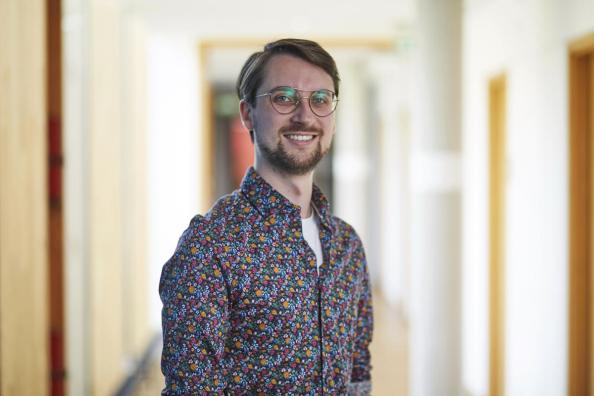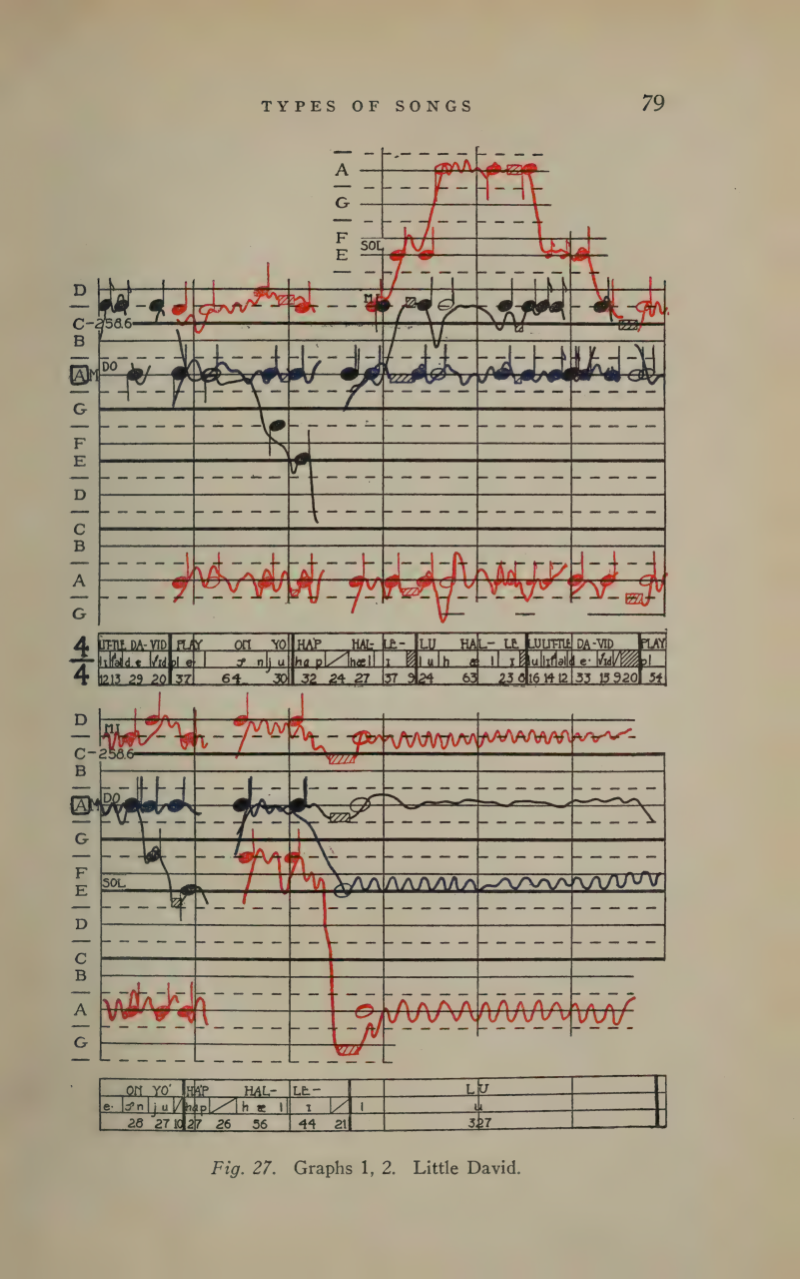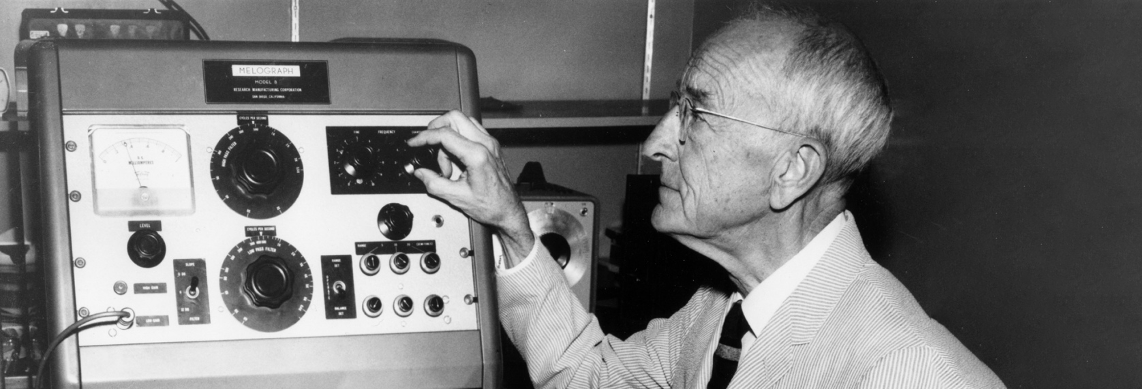
Image 1: Transcription of a chant based on visualization by the Photophonograph (© Metfessel, Milton (1928). Phonophotography in Folk Music. American Negro Songs in New Notation. Chapel Hill, NC: University of North Carolina Press, p. 79.).
Image 2: Visualization of a chant of the Ute by the Oscillograph (© Densmore, Frances (1922). Northern Ute Music. Washington, DC: Washington Government Printing Office, p. 106.).
Image 3: The ethnomusicologist Charles Seeger at his Melograph (© UCLA Los Angeles. Ethnomusicology Archive, https://digital.library.ucla.edu/catalog/ark:/21198/zz0025m6zm.).
The Politics of Music Capturing. Music Information Retrieval and Ethnomusicological Research, 1900–1970
Christopher Klauke’s research project explores the ways in which concrete political structures and beliefs have influenced the historical development, establishment, and operativity of the knowledge techniques of music capturing.
Music Information Retrieval has become a central and widely used resource for today’s data-driven music culture. It enables the algorithmic transcription and analysis of music and is used by, for example, music streaming platforms and large-scale musicological projects. Surprisingly, this knowledge technique emerged within disciplines peripheral to the humanities: ethnomusicology and folk music research, which were shaped by colonial, eugenic, or emancipatory assumptions. From 1900 onward, various machines—such as phonophotographs, melographs, or spectrographs—were developed that were able to address and translate the audio signals of non-Western music recordings into diagrammatic forms.
Methodologically, the project is situated in media history, specifically Kulturtechnikforschung, and in postcolonial history of knowledge. It draws on recent publications in the fields of science and technology studies, musicology, and visual studies.
Christopher studied musicology, music pedagogy, and art history at Justus-Liebig-Universität Giessen for his BA. He earned his MA in musicology at Humboldt-Universität zu Berlin in 2022 with a thesis on techniques of measuring and listening in the Phonogramm-Archiv Berlin.
Publications & Presentations
Articles (Selection):
Klauke, Christopher, and Valentin Ris (under review). “Epistemologien, Praktiken und Politiken der Organologie: Überlegungen zu einer kulturtechnisch orientierten Instrumentenforschung.” In: Instrumentenforschung 2.0, edited by Alan Ruben van Keeken and Johanna Imm. Osnabrück: Olms.
Klauke, Christopher (2025 – in print). “Appunns Tonometer. Zu den Politiken eines zeitkritischen akustischen Interfaces im Phonogramm-Archiv Berlin.” In: Akustische Interfaces, edited by Christoph Borbach and Robert Stock. Wiesbaden: Springer.
Klauke, Christopher, and Raphael Börger (2024). “Beiträge zur Musikwissenschaft. Anmerkungen zu einer musikalischen Wissensmaschine in Ost-Berlin 1959–1990” In: Musikwissenschaftliche und musikalische ›Schulen‹? Strukturen, Analyse, Dynamiken, edited by Jakob Uhlig. online: musicon.
Klauke, Christopher (2024), "Von der Klang-Sammlung zur Klang-Daten-Sammlung Praktiken der Datafizierung in der Vergleichenden Musikwissenschaft um 1900.“ In: Kunsttexte (Themenheft: Auditive Perspektiven: Klänge sammeln), 2024/2.
Klauke, Christopher, Anne Delle, Alan Fabian, José Gálvez, Steffen Just, and Veronika Muchitsch (2023). “Klangliche Materialität(en) von Musik — Versuch einer So(u)ndierung in den Popular Music Studies. Ein Forum.” In: All the Things You Are. Populäre Musik und materielle Kultur, edited by Ralf von Appen und Peter Klose. Bielefeld: transcript.
Klauke, Christopher (2020). “Gemeinschaftsstimme. Klangpolitik, Volkskörper-Werden und Massensingen im Nationalsozialismus.” In: Wissen im Klang. Neue Wege der Musikästhetik, edited by José Gálvez, Jonas Reichert, and Elizaveta Willert, 79–91. Bielefeld: transcript.
Presentations:
December 2023: "Zwischen Datenkolonialismus und Pawnee-Ontologie. Politiken der Musikerfassung in der Vergleichenden Musikwissenschaft um 1900,“ Invited Presentation at the Colloquium Series „Wissenschaftsgeschichte / Praxeologien der Wahrheit,“ Universität Erfurt.
July 2023: “Politiken der Musikerfassung,” Invited Presentation at the Colloquium of Musicology/Sound Studies, Universität Bonn.
May 2023 with Valentin Ris: “Interfacing Micro-Time Machines 1900/2000. The Cultural Techniques of the Tonometer and DAW,” Instruments, Interfaces, Infrastructures. An Interdisciplinary Conference on Musical Media, Harvard University.
January 2023 with Christina Dörfling: “Arbeitsmethode... team work – Popularmusik-Forschung in Ost-Berlin,” Populäre Musik und ihre Geschichte. Sammeln - Forschen - Publizieren, Lippmann+Rau Musikarchiv Eisenach.
October 2022: “Between Music-Anthropological Research and Culture Regulation: Cybernetic Investigations of Popular Music in the GDR 1957–1970.” as part of the panel with Alan van Keeken “Scientific Investigations and Critique of Popular Music and Sound in the GDR and FRG 1950–1970: Two Case Studies.” Parallelgesellschaften: conference of the Gesellschaft für Popularmusikforschung and the International Association for the Study of Popular Music, Universität für Musik und Darstellende Kunst Wien.
May 2022: “Appunns Tonometer. Zur Kolonialität eines akustischen Interfaces zur Vermessung von Musik im Phonogramm-Archiv Berlin,” Akustische Interfaces, Humboldt-Universität zu Berlin.
December 2021 with Raphael Börger: “Zu einer musikalischen Wissensmaschine Ost-Berlin 1959-1990,” DVSM-Symposium: Musikwissenschaftliche und musikalische ›Schulen‹? Strukturen, Analyse, Dynamiken, online.
November 2021: Poster “Appunns-Tonometer. Zur concrétisation eines Instruments, das andere Instrumente vermisst, oder: eine Organologie der Organologie um 1900,” Instrumentenforschung 2.0, Martin-Luther-Universität Halle-Wittenberg.
October 2021 with Lorenz Gilli and Steffen Just: Round Table “Klangliche Materialität der Musik. Eine Soundierung” (speakers: Alan Fabian, José Gálvez, Maren Haffke, Johanna Imm, Veronika Muchitsch, Katharina Preller), All the Things You Are. Populäre Musik und materielle Kultur, Technische Universität Dortmund.
November 2020: “Volkskörper-Werden. Körperpolitische Dimensionen der gesanglich artikulierten Gemeinschaftsstimme im Nationalsozialismus,” Body and Corporeality in 20th and 21st Century Music, University of Music and Performing Arts Graz.
Organized Events:
March 2021 with Raphael Börger: conception, coordination and opening presentation of the online symposium „Musik als Wissensmaschine — Experiment einer Hörenden Philosophie und Kulturwissenschaft. Ein Symposium der HUG“ (funded by Humboldt Universitäts Gesellschaft), Dept. for Musicology and Media Studies, Humboldt-Universität zu Berlin. https://musikalswissensmaschine.de/ ; https://www.hug-berlin.de/projects/musik-als-wissensmaschine/.
November 2020 with Sandra Bogdanovic, Jasmin Goll and Pia Wolff (as „Forschungsgruppe Musik und Intermedialität" of DVSM): conception, coordination and opening workshop unit of the online workshop „Musik und Intermedialität,“ Dept. for Musicology and Media Studies, Humboldt-Universität zu Berlin.


